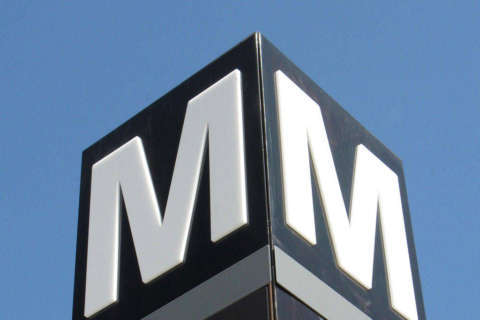RICHMOND — Republican leaders in Virginia’s General Assembly gave a chilly reception Monday to outgoing Gov. Terry McAuliffe’s plan to give Metro new dedicated funding for critical capital maintenance needs, as well as other proposals.
The overall, $42.4 billion two-year general fund budget proposal submitted to the General Assembly Monday morning also includes another attempt by the Democratic governor to expand Medicaid to cover about 400,000 more low-income Virginians as allowed under the Affordable Care Act.
The plan, and the roughly $412 million in short-term savings projected in the budget if the expansion began Oct. 1, 2018, are unlikely to move forward as is, Republican leaders said.
McAuliffe also proposed a two percent raise for state workers and teachers in the second year of the budget. Republican leaders said the proposal may need to be changed to focus the raises on positions where the money is most needed to keep top talent in the state government.
The once-wide GOP majority in the house of delegates has fallen though to just 51-49, though, pending three recounts this week. In the Senate, where Medicaid expansion has passed before, the Republican majority remains 21-19, with incoming Lt. Gov. Justin Fairfax, a Democrat, set to break any ties.
Incoming Gov. Ralph Northam, who takes office Jan. 13, sat with Fairfax and Attorney General Mark Herring behind McAuliffe during the budget presentation.
In a statement, Northam said he supports Medicaid expansion, as well as the funding focused on education, mental health and mass transit.
Del. Kirk Cox, who expects to become House Speaker next month, praised Northam’s recent comments supporting some reforms for the state’s Medicaid program to cut into growing costs, even as Northam supports expanding the program to cover more people.
The budget proposal covers Jul. 1, 2018, through Jun. 30, 2020, although some pieces, such as worker raises, would only begin in the second year.
Education funding increases and Medicaid expansion are the biggest spending increases in the proposal.
New taxes for Metro get cold shoulder
Republican leaders in the General Assembly quickly shot down McAuliffe’s plan to dedicate funding to Metro if Maryland and the District also chip in their share and agree to a new, smaller Metro Board.
“I think Metro’s a high priority, but I think what we need to make sure we’re doing is look at some of the reforms first. What the governor’s proposing is put a tax increase first, but the reforms, they never seem to come,” House Republican Caucus Chair Tim Hugo said.
Hugo, who represents parts of Fairfax and Prince William counties, instead praised a proposal on Capitol Hill from fellow Republican Barbara Comstock to rip up a number of Metro contracts to cut costs. Presumptive House Speaker Kirk Cox also praised Rep. Comstock’s bill.
“I think one of the problems we always have is the reforms are glossed over,” Cox said. “The only thing the governor mentioned was the reform board, and so that was sort of the perfunctory, ‘Here’s your reform, now the funding.'”
McAuliffe warned that without the $150 million from Virginia and similar shares from Maryland and D.C., Metro could be forced to cut service, fueling a death spiral of declining ridership and reduced revenue. The proposal would raise the Northern Virginia hotel tax from 2 percent to 3 percent, raise a real estate transfer tax and set a minimum on the regional gas tax. It would also designate some existing Northern Virginia regional transportation money for the Metro system.
“It’s a tax increase the General Assembly’s already voted for, so it’s sort of a no-brainer,” he said, citing the vote on the initial transportation funding bill in 2013 before revisions by then-Gov. Bob McDonnell.
While the new Metro Board would have extraordinary power under the Comstock bill, the reduced five-member board McAuliffe backs, as suggested by former U.S. Transportation Secretary Ray LaHood, would have the same powers as the existing board.
“[The present] 16’s too many; if you get it down to five, I think it’s important who we pick,” McAuliffe said. “We are at a breaking point.”
In an interview following the budget presentation, Hugo said Metro must address pension costs, among other issues, before discussing any new funding.
He could not say how long that might take. “I hope soon for the riders of Northern Virginia,” Hugo said.
Gas tax floor floated
Of all three tax increase proposals for Metro, longtime Finance Committee Chair Del. Chris Jones only seemed open to the gas-tax floor, an idea that has been a priority for lawmakers from Richmond and Hampton Roads almost since the major transportation funding bill that established it was signed in 2013.
“I think instating the floor is something we will look at and strongly consider, but until the reforms are in place I think it’s premature to make any comments that we will support or not support an item,” Jones said.
Unlike the statewide gas tax, the regional gas taxes in Northern Virginia and Hampton Roads for regional projects were set in 2013 as a percentage of the wholesale price, without a minimum level.
Setting the minimum at the price of gas in 2013 could raise millions of dollars. Jones does not necessarily believe that money should be dedicated to Metro, though.
“The board, the management, the operation of the system — they need to be more efficient in how they’re operating,” he said.
Jones said Metro is a priority, but Senate Majority Leader Tommy Norment said it was just one of many.
“If you listen to everything said today, you would think that today was Dec. 25 and Santy Claus [sic] had arrived with a sleigh full of goodies. Well, all of these goodies are not going to be able to be distributed at the dollar levels that he is proposing, and we’re going to have some very, very serious work ahead of us in determining those priorities,” Norment said.
Federal tax reform bill, children’s insurance, Medicaid expansion
The Republican leaders cited uncertainty in GOP-controlled Washington as another factor that could shift Virginia’s budget, but said they do plan to support some kind of funding for certain increased medical care, even as they oppose Medicaid expansion.
“I think it’s realistic to expect there will be some additional coverage for Virginians,” Jones said; Norment agreed.
Virginia recently warned families on the commonwealth’s Children’s Health Insurance Program that they could be kicked off on Jan. 31 if Congress fails to reauthorize promised federal payments.
Virginia is waiting on about $80 billion, and without action from Congress, Jones said, the state could have to fill that gap.
“Do you want to depend on Congress?” Jones said. “It makes the case for not expanding Medicaid as we know it, because [CHIP] was a program widely acclaimed by both sides of the aisle for 20 years.”
Norment said lawmakers are watching Congress very carefully.
“There are still uncertainties coming out of Washington … and if they don’t fund CHIP, then obviously we’re going to have to step in and do something,” Norment said.
In addition to questions about government shutdowns or a lack of money for individual programs, Jones said, the full effect of the tax reform legislation set for an imminent vote is also not clear.
“We don’t know what tax reform is really going to mean to all the states across the country, so that’s got to be evaluated; we’ve got to look and see if that’s a net positive or a net loss for Virginia. … We will take a cautious approach,” Jones said.
‘New Virginia Economy’
In McAuliffe’s final address to the General Assembly’s joint money committees, he touted billions in economic deals his office has announced during his four years in office under the mantra of promoting “a new Virginia economy.”
With many of the deals still going through the permitting process, Norment questioned whether they will really have the promised economic impact.
“We’re hopeful that they will, but I do think that his enthusiasm is a little exaggerated,” Norment said.
“I think in his mind’s eye he has an incredibly accurate eye [on the state of Virginia’s economy]; however, I do know a very good optometrist that might help him focus a little bit,” Norment said.
The budget proposal sets up the General Assembly to remove some additional money from a long-desired increase to the state’s reserve funds to fill the hole left if Medicaid expansion is removed from the budget.
“Many governors come in and make proposals that take place in the out years when they are not there to be held accountable on it, and some of the proposals that he’s made, when you aggregate them together, are very significant,” Norment added.







